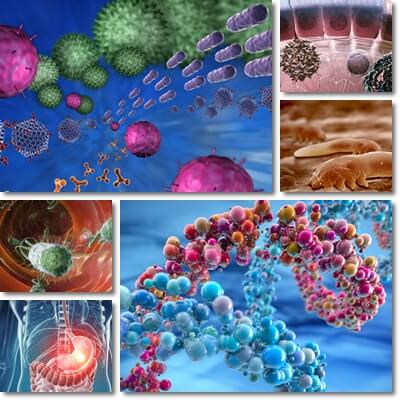The human gastrointestinal system is home to trillions of microorganisms, mainly bacteria, but also fungi and protozoa. And they all make up a freestanding ecosystem also referred to as the gut flora. Gut bacteria are the ones that affect our health the most, usually in mutually beneficial ways. Digestive bacteria feed off of what we eat, breaking down food into its simplest constituents and even synthesizing essential vitamins to contribute to our nutrition. Because the healthier we are, the better it is for them too.
Healthy, flourishing populations of the good kind of bacteria means good gastrointestinal and overall health for us, while gut flora imbalances with growing populations of pathogenic bacteria means side effects and disease. So it’s true to say that our gastrointestinal microbiota, meaning the total of microorganisms living in our digestive tract, determines our health. The question is how: how does gut bacteria affect our health more exactly? From nutrient synthesis and nutrient absorption to regulating the uptake of neurotransmitters for the brain, these are the most important ways gut flora impacts our health.

Vitamin synthesis
Synthesis of vitamin K2 and all B vitamins, in varying amounts, is achieved by a host of microorganism right in our gastrointestinal tract. One of the biggest benefits of gut bacteria is the fact they are able to make vitamins B1, B2, B3, B5, B6, B7 (biotin), B9 and B12 as well as vitamin K2. Of course, depending on the specific type of bacteria and its numbers, more or less of these nutrients is synthesized.
What gut bacteria produce vitamins?
Bacillus subtilis found in natto and fermented cheeses produces a vitamin K2 homologue called menaquinone-7. Some Escherichia coli strains produce the same type of vitamin K2 from vitamin K1 (phylloquinone). Lactobacillus reuteri, found in the normal human gastrointestinal flora and in sourdough, produces vitamin B12 (cobalamin). Several commensal and many pathogenic bacteria also produce vitamin B12. The gram-positive bacterium Propionibacterium freudenreichii, used to make Emmentaler cheese, also synthesizes vitamin B12.
Lactobacillus plantarum is a lactic acid, probiotic, gram-positive bacterium that synthesizes a highly bioavailable vitamin B9 (folate). It also helps make fermented foods like sauerkraut, kimchi, olives in brine, pickles and some cheeses. Lactobacillus fermentum is known to produce good amounts of vitamin B2 (riboflavin). Other good gut bacteria produce varying amounts of vitamin K and vitamins B12 (cobalamin), B9 (folate), B6 (pyridoxine), B5 (pantothenic acid), B3 (nicotinic acid), B2 (riboflavin), B1 (thiamine) and vitamin H (or vitamin B7, vitamin B8 or biotin).
Eating fermented foods can provide us not only with beneficial, live bacteria to boost healthy gut bacteria populations, but also generous amounts of B vitamins and vitamin K2.
Read more about what Foods to Eat for Healthy Gut Bacteria. For the most part, the types of beneficial bacteria that produce vitamins are Gram-positive, although there are some pathogenic Gram-negative bacteria that also synthesize nutrients.
Read more about the Difference between Gram-negative and Gram-positive bacteria.

How does gut bacteria aid in digestion?
Gut bacteria feed on the food we eat, but require only certain constituents in it. So they’ve developed mechanisms to break down most food in its simplest constituents so they can get the nourishment they require. This frees nutrients for us as well, contributing to our nutrition.
Another way they are good for digestion is via fiber fermentation. Dietary fiber is plant material we can’t digest or absorb, but gut bacteria ferment it to extract food for them to sustain themselves. And healthy populations means the capacity of digesting a greater variety of foods, even less food sensitivities and a better tolerance to various foods, with less adverse reactions and less inflammation as a result of it.
How does gut bacteria affect your weight?
Studies on gut bacteria and obesity find there are differences in the types of gastrointestinal flora between thin people and fat people. Digestive bacteria not only break down food in simpler constituents, but also regulate how these constituents are absorbed and to what extent. At a higher level, this translates into differences in how the human body makes use of and deposits various elements and whether we lose weight and maintain a healthy, steady weight or gain weight.
Which gut bacteria promote weight loss and which cause weight gain? There isn’t one specific bacterial strain or genera that causes weight gain or weight loss. It’s actually the entire gastrointestinal ecosystem and how it directs nutrient absorption, the presence or absence of specific types of healthy bacteria and their numbers that regulate digestion and absorption of nutrients which, in turn, impacts weight. Acquisition of gut flora in the first two years of life, gut flora diversity as well as how well its diversity is maintained throughout life with diet can determine weight loss or weight gain.
How does gut bacteria affect the brain?
Animal studies show that a total lack of gastrointestinal bacteria (such as in mice grown to have an aseptic gastrointestinal system) can lead to cognitive disturbances and symptoms of anxiety, depression and more severe neurological disorders.
Similarly, the idea that imbalances in gut flora affect the expression of a molecule called miRNA or microRNA has been advanced. Altered miRNA function is associated with a variety of diseases, from cancer to some forms of autism, diabetes, hereditary diseases and mental disorders.
Gastrointestinal flora also plays a part in activating the vagus nerve, with direct effects on brain and nervous system activity. Moreover, gut flora is vital for the development of the serotonin system as well as directly determines the uptake of several neurotransmitters that regulate brain activity. The brain and the gut further communicate via the immune system (bacteria in the gastrointestinal tract can activate the immune system or suppress it).
Gastrointestinal bacteria further produce metabolites with strong endocrine-like functions and neuroactive action which are transported in the blood to the brain and significantly affect brain and nervous system functions. Lastly, studies show bacteria themselves produce neurotransmitters such as serotonin, norepinephrine or dopamine as well as synthesize amino acids which contribute to brain and nervous system function.
There are many ways through which gut flora regulates brain activity and the discovery of the communication systems between the gut and the brain and nervous system allow us a mere glimpse inside the complex functions of this ecosystem and its regulatory action on the nervous system.
Gut bacteria and anxiety and depression
Because it regulates the absorption of essential nutrients, an imbalance in gut flora populations can result in severe malabsorption problems. This could lead to severe magnesium or B vitamins deficiencies, both of which can manifest as anxiety or even depression or worsen an existing condition.
Gut flora further regulates the uptake of neurotransmitters for the brain as well as produces some of them or their precursors and an imbalance could further affect mood and cause anxiety and depression symptoms.
Imbalances in digestive flora also generate gastrointestinal symptoms such as severe bloating, gas, nausea, stomach heaviness or pain, malaise, vomiting sensation, loose stools or diarrhea or cause weakness and fatigue and all sorts of symptoms that affect quality of life and can encourage feelings of anxiety and depression to install.
Serotonin (which regulates mood, sleep, even appetite), dopamine (regulates movement and emotional responses), nor-epinephrine (which mobilizes both brain and body for action) are just a few of the neurotransmitters produced by bacteria in the gut and whose uptake is regulated by them. Any deregulation in normal gut flora can result in altered brain function and encourage mental health and neurodegenerative disorders, from anxiety and depression to Alzheimer’s disease or Parkinson’s.
Gut bacteria and autism
There are those that believe certain autistic traits can be traced back to imbalances in gut flora populations. For example, studies show gut bacteria can alter the expression of miRNA or microRNA molecules which are responsible for nervous system development such as the development of dendrites in nerve cells (tree like projections of nerve cells that conduct electrical impulses). Moreover, digestive bacteria synthesize several neurotransmitters and affect the uptake of many more, playing a big part in emotional responses and overall brain chemistry and nervous system regulation. As such, there is belief that some traits on the autistic spectrum may be caused by gut bacteria imbalances.
How does gut bacteria affect hormones?
The gut microbiome acts as a secondary endocrine system as a result of the various metabolites bacteria synthesize (like short chain fatty acids), help synthesize or regulate. These metabolites act as hormones as they target specific aspects of human metabolism, hence the reason gut flora is seen as an endocrine system itself. Whether it’s weight loss or weight gain, elimination of excess estrogen, regulation of blood sugar levels, nutrient absorption, participation in nervous system development or a neuroendocrine side that modulates emotional responses, digestive bacteria affect hormones in diverse ways.
Gut bacteria and diabetes
A healthy gastrointestinal flora can help prevent type 2 diabetes indirectly by preventing excess weight gain which represents a risk factor for the disease. Studies show there is a connection between gut flora imbalances causing weight gain and obesity and a higher risk for diabetes.
Moreover, gastrointestinal bacteria regulate the expression of certain miRNA molecules which are responsible for insulin resistance. Also, unhealthy changes in digestive flora trigger inflammatory and autoimmune responses which could increase the risk for both type 2 and type 1 diabetes. And these are only a few of the many ways digestive bacteria affect our health.
